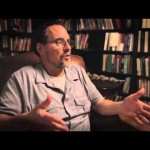We run our website the way we wished the whole internet worked: we provide high quality original content with no ads. We are funded solely by your direct support. Please consider supporting this project.
A Calvinist Take on the Problem of Evil
Here’s a Calvinist view on the problem(s) of evil in the wake of the Sandy Hook shootings. It’s the old God-as-author analogy. In essence, this is how Calvinism views God’s role in any instance of radical evil (quoted from the Desiring God article):
But, of course, the Bible says more than that God could have prevented it; it says that it occurs “according to the counsel of his will” (Eph 1:11). Indeed, he works all thingsaccording to the counsel of his will. And when the Bible says ‘all things,’ it means all things:
This ‘all things’ includes the fall of sparrows (Matt 10:29), the rolling of dice (Prov 16:33), the slaughter of his people (Ps 44:11), the decisions of kings (Prov 21:1), the failing of sight (Exod 4:11), the sickness of children (2 Sam 12:15), the loss and gain of money (1 Sam 2:7), the suffering of saints (1 Pet 4:19), the completion of travel plans (Jas 4:15), the persecution of Christians (Heb 12:4–7), the repentance of souls (2 Tim 2:25), the gift of faith (Phil 1:29), the pursuit of holiness (Phil 3:12–13), the growth of believers (Heb 6:3), the giving of life and the taking in death (1 Sam 2:6), and the crucifixion of his Son (Acts 4:27–28). (John Piper, “Why I Do Not Say ‘God Did Not Cause This Calamity, But He Can Use It For Good’”)
All things — good, bad, ugly, and horrific — are ordained, guided, and governed by the Creator and Sustainer of the universe.
The God-as-author analogy fleshes out regarding the problem of evil like this (from the Desiring God article):
The Classic Problem of Evil
Stated simply, the philosophical problem goes like this:
(1) If God is all-knowing, then he knows what evil is.
(2) If God is all-good, then he himself is not evil and he would prevent evil, if he could.
(3) If God is all-powerful, then he can prevent evil.
(4) Evil exists.
(5) Therefore (1), (2), or (3) (or some combination), must be false.The author-story analogy clearly holds to (1) and (3). It’s (2) that is denied, since God remains all-good even if he allows and ordains evil for his own wise and good purposes. In other words, God may ordain that evil exist because the existence of evil serves somegreater good that God has in view. The author-story analogy sheds light on how God is not tainted by the evil of his creatures and on why God would ordain evil for his own wise purposes.
Frankly, this creates more problems than it solves, not the least of which: how, exactly are we to genuinely love this kind of God? Roger Olson responded to this article with his own really good question here. Especially in light of our article yesterday about Henry, this kind of theologizing is beyond incomprehensible to us. Here’s Roger’s question:
If I could talk to Rigney (or someone who agrees with him), here is what I would ask:
“You seem to believe that people who understand God’s sovereignty the way you do (as all-determining, comprehensive, meticulous) rightly feel not only shock but abhorrence at events such as school shootings in which multiple children are killed. But why? My question is not why you DO, but why you think it’s right to have such feelings. I”m not asking about moral rightness; I’m asking about logical rightness.
That’s a good question.
This is why we’re here. ReKnew is committed to spreading the good news of Jesus who loves us by being born into our suffering and healing our diseases and dying on a Roman cross as opposed to the theology of an omni-controlling deity who ordains the slaying of children for his own mysterious purposes.
Category: General
Tags: Calvinism, Current Events, Death, Henry, Problem of Evil, ReKnew, Roger Olson, Theodicy
Related Reading

Another Sneak Peek from Benefit of the Doubt
As we approach our ReKnew conference next month, we’ll be posting snippets of Greg’s book, Benefit of the Doubt. We hope you’ll be joining us. We extended the deadline for early bird registration. Get on that before Friday at midnight! What Is Your Actual God? In light of all this, what should be said about…

Why Bart Ehrman Doesn’t Have to Ruin Your Christmas (Or Your Faith) Part 1
This is the first of several videos Greg put together to refute Bart Ehrman’s claims published in the article What Do We Really Know About Jesus? Greg went to school with Bart and is very familiar with his line of thought. He’s also heard of many people who have lost their faith based on his writings.…

Sermon Clip: Escaping the Twilight Zone God
In this sermon clip from Woodland Hills Church, Greg Boyd discusses how in an episode of the Twilight Zone, a young boy gained omnipotent powers, and people were forced to accept his every decision as good—or else. In the full sermon, Greg shows how many people view God this way, and he opens up another…

Are You Anti-American?
Greg answers the frequently asked question of whether he is anti-American. What’s your best guess? Watch the video and find out!

Let Us Pray
Per Ola Wiberg via Compfight It’s appropriate to pray and reflect and run to God when tragedies like the one in Newtown, CT take place. We wanted to share a couple of things we found helpful around the blogosphere as we struggle through our sadness. T.C. Moore shared some thoughts on Darkness, Advent, and Newtown CT on…

When the Bible Isn’t Clear
Mark Grapengater via Compfight Roger Olson wrote a post today entitled How to Solve a Theological Dilemma when Scripture Doesn’t Clearly Solve It: An Exercise in Theological Method. The title itself is provocative and problematic if you’re a fundamentalist, so Roger spends some time dealing with the mindset of fundamentalism. This is a really valuable read if…

